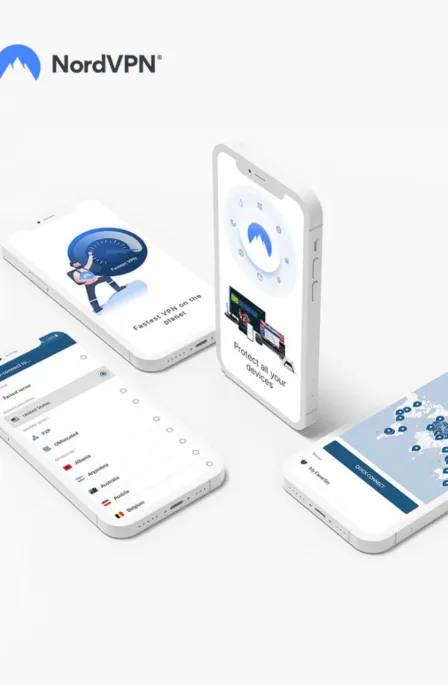Encryption is a method for enhancing the security and privacy of sensitive data or information that anyone can access.
It is a process that converts the actual data and information into an unreadable and coded format, which is protected by an encryption key set by the authorized user only.
The data can be decrypted when the authorized user correctly enters the key. There are different categories of encryption like file encryption:
- Full disk encryption
- Device encryption
- VPN encryption
Why encryption is important?
Cybercrimes are very common as hackers, spammers, and other snoopers, including government security and surveillance agencies, who are using high-end technology to access your network and steal sensitive information and data.
That harms your device physically but is also dangerous for your confidential information, such as bank account details, credit card information, private conversations, photos, videos, and other similar information. No one ever wants such sensitive data to be in the wrong hands.
How can internet data be encrypted? You don’t need to worry because there is a solution for this Internet data encryption. It is done using a tool called Virtual Private Network (VPN) and VPN Encryption.
What is VPN Encryption
VPN Encryption is when a VPN hides your data in a coded format unreadable by anyone trying to snoop on it. A VPN encrypts the data when it enters and passes through its tunnel, then decrypts it at the other end, where the VPN server connects you to your requested website; meanwhile, all your login details are kept through the secure transfer hidden by VPN encryption.
Below, we learn something about the technological aspects of VPN encryption.
Different types of VPN
A VPN uses different combinations and techniques for encryption, which can be easily understood when you know the types of VPNs and the protocols they use for encryption and security.
1. Site to Site VPN
Companies often need to connect one of their offices to another office remotely with privacy and secrecy maintained. This is achieved by installing a site-to-site VPN, which builds a private encrypted tunnel and provides a secure connection between the office branches in any location.
Offices mainly use a Site-to-Site VPN, also known as Router-to-Router VPN, because one router acts as a VPN Client, and the other serves as a VPN server to provide secure and anonymous internet within offices in different locations.
2. Remote Access VPN
A Remote Access VPN provides the internet connection to its users remotely through its private network. Home users and office employees use it mostly to connect to their company’s server when traveling away from the office location.
It connects individuals by creating a secure virtual tunnel between the user’s computer or device and the VPN server, connecting them to the internet with a secure encrypted tunnel.
Home users usually use this VPN to eliminate geo-restrictions and access the blocked websites in their region. In contrast, office employees use it when they want to access the company’s server from a different location.
Types of VPN protocols
The level of privacy and security you get from a VPN depends on what type of protocol it uses to secure your data and maintain privacy. The VPN providers use different types of VPN protocols; each type of VPN protocol provides an extra level of security, so let’s take a look at them.
1. IPSec – Internet Protocol Security
Internet Protocol Security or IPSec is the most common VPN protocol used by site-to-site VPNs to ensure data safety on IP networks, including the Internet. It can secure data between the router, firewall to the router, desktop to the server, and desktop to the router.
It mainly uses two sub-protocols: Encapsulated Security Payload (ESP) and Authentication Header (AH), to instruct the data packets traveling through the tunnel. Both send instructions based on which type of data packets transfer via the tunnel.
2. L2TP
L2TP is a tunneling protocol that combines IPSec to build high-end security, privacy, and a highly secure VPN connection. It is the primary point-to-point protocol (PPP) used majorly as a tunneling protocol and other encryption protocols like IPsec to strengthen and enhance security and privacy. It supports site-to-site VPNs but you will mostly see its usage in remote access VPNs.
3. PPTP
PPTP protocol is the most commonly used protocol and supports thousands of operating systems and devices. It is responsible for encrypting the data from one point to another by creating and transferring an encrypted tunnel. It supports 40-bit and 128-bit encryption or any other scheme supported by PPP.
4. OpenVPN
OpenVPN is an open-source software application that uses a VPN mechanism to create a secure point-to-point connection in virtual tunnels and remote access features. It is considered the most secure VPN to provide diverse and complex security protocol functions.
5. SSTP – Secure Socket Tunneling Protocol
It is mainly used for high-end Encryption in Windows as it’s a Microsoft proprietary protocol, so where OpenVPN is not supported, SSTP can be implemented for the same level of security and encryption. It is more robust than PPTP and L2TP/IPSec.
6. Secure Sockets Layer (SSL) VPN Encryption
Unlike other traditional VPN protocols used in particular VPN software, Secure Sockets Layer SSL VPN encryption is used for web browsers. It is also used in browser extensions, which don’t require any specific app to install and set up.
SSL encryption can be directly added to the internet browser and has an on/off switch to operate when you need to use it and turn it off when you are done. It mainly provides remote users access to client/server applications, Web applications, and internal network connections.
7. Multi-Protocol Label Switching (MPLS) VPN Encryption
Multi-Protocol Label Switching (MPLS) builds virtual private networks (VPNs). It is a convenient and flexible way to route and transfer various types of network traffic using the MPLS backbone structure; the most common types of MPLS VPNs used today are:
- Point-to-point (Pseudowire)
- Layer 2 (VPLS)
- Layer 3 (VPRN)
A VPN tunnel connects your computer to its server, and it must be fully secure and encrypted. An encrypted VPN tunnel ensures that all your data traveling through it is hidden from the eyes of anyone trying to snoop on your network. In contrast, an unencrypted tunnel can leak your data information due to weak encryption protocols.
VPN without encryption
Not all VPNs need to offer encryption. It is a sporadic case that a VPN tunnel is unencrypted, but it happens; some VPNs might not use encryption to protect data traveling via a tunnel. For example, a VPN tunnel between two hosts may use Generic Routing Encapsulation (GRE), which is expected to be encrypted but is neither secure nor trusted.
Such VPNs without Encryption are dangerous and trap users’ data because they believe all their data is safe. No one can see what they are doing online, but that is where they are wrong, and sometimes even using such unencrypted VPN, people get attacked by cybercriminals.
VPN encryption algorithms
VPN uses protocols and some encryption algorithms for ultimate privacy protection. Three encryption algorithms, AES, RSA, and SHA, are mainly used by commercial or standard VPN companies, and they are briefly described below.
AES (Advanced Encryption Standard)
It is a secure algorithm used in symmetric key encryption. It supports various critical lengths of 128, 192, and 256 bits. The longer the key size, the stronger the encryption, but it also takes more time to process, resulting in a slower connection speed.
RSA
It is based on the names of people who officially described this algorithm in past years. It is used in an asymmetric public key system, which means a public key encrypts the data, but a different private key is used to decrypt it. All the current VPN protocols, like OpenVPN SSTP, are usually used for the best and strong encryption.
Secure Hash Algorithm (SHA)
SHA—The Secure Hash Algorithm (SHA) created by Cisco is very secure and robust. It requires both the sender and receiver to use this algorithm while encrypting and decrypting the message or data traveling through the VPN tunnel.
Share this article
About the Author
Waqas is a cybersecurity journalist and writer who has a knack for writing technology and online privacy-focused articles. He strives to help achieve a secure online environment and is skilled in writing topics related to cybersecurity, AI, DevOps, Cloud security, and a lot more. As seen in: Computer.org, Nordic APIs, Infosecinstitute.com, Tripwire.com, and VentureBeat.
More from Iam WaqasRelated Posts

What is VPN Split Tunneling and How Does it Work?
Split tunneling is a VPN feature for anyone accessing foreign networks while connecting to their LAN...

Why is Opera VPN Not Working? How to Fix Opera VPN?
KEY TAKEAWAYS Opera VPN is a proxy service, not an actual VPN. That’s why it doesn’t wor...

VPN vs. Firewall vs. Antivirus: Which One is Better?
KEY TAKEAWAYS VPN, Antivirus, and Firewall are the most important tools to protect your online priva...

A Guide to Choosing the Right VPN for Downloading
How to hide downloading files from ISP? From the very start of the hilarious popularity of P2P file-...

What is Port Forwarding and How Does it Work?
Port Forwarding is a technique for redirecting computer signals between the local network and the In...

What is DNS Hijacking? How to Prevent and Fix it?
DNS Hijacking, also known as DNS Redirecting or DNS Poisoning, is a strategy used by cyber pillagers...





